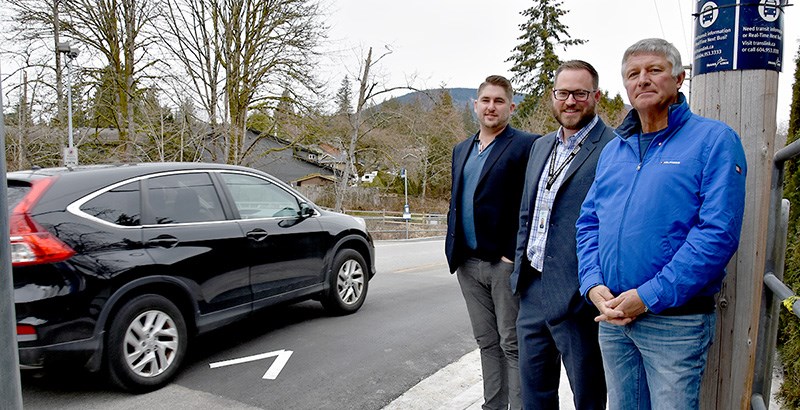There’s still some road painting and landscaping to do but the $312,500 work to improve traffic and pedestrian safety along Cedar Drive in Port Coquitlam is, for the most part, complete.
The north-south corridor that links Prairie Avenue to the lower slopes of Burke Mountain was recently updated with curb extensions at Pinemont, Patricia and Lincoln avenues, and a raised crosswalk at the Traboulay PoCo Trail — as well as more sidewalks on the east side, north of Essex Avenue — in a bid to slow commuters along the stretch that has a 50 km/h limit, schools, parks and trail access points.
The traffic volume on Cedar Drive is also an ongoing issue, said Forrest Smith, PoCo’s director of engineering and public works, during a site tour Monday with capital projects manager Jason Daviduk and Coun. Darrell Penner, a former area resident who is council’s public works and transportation liaison.
Since 2010, city staff have seen a 34% spike in the number of vehicles travelling Cedar Drive — a significant bump they attribute to the neighbourhood densifying as well as the growth uphill in Coquitlam.
“Typically, we only like to see a 2% increase a year,” Smith said.
The 4,300 vehicles that drive the two-lane road on each weekday have been a constant source of complaints by area residents.
The topic came up in during community consultations to look at safety measures and, in 2014, when the city hosted a public meeting about the proposed Fremont connector, a contentious yet-to-be-built link from Burke to Lougheed Highway, near Fremont Village.
Currently, with only three ways to get to and from Burke (David Avenue, Coast Meridian Road and Cedar Drive), the need to get Fremont built is mounting.
Penner said tensions between PoCo and Coquitlam on the Fremont alignment are thawing and city managers are now revisiting the planned route, trying to find ways to make it work — other than down Devon and Burns roads with a hook at Prairie Avenue, an alignment decided by PoCo council in 2015.
Dan Mooney, Coquitlam’s transportation manager, said both cities will be applying to the Agricultural Land Commission later this year to look at a route option that would cross farmland, farther to the east.
“We’re not opposed to their route,” Mooney said of PoCo’s proposal. “We’re not stuck on their position but we need to have Fremont act as an inter-municipal road.”
Last fall, both cities made a joint submission to TransLink to have Fremont be included in the Major Road Network, which would provide regional money for operations, maintenance and rehabilitation. But while receptive, Mooney said, the TransLink mayors’ council denied the request as Fremont is still not built.
“Our community is bearing a very heavy burden from the development on Burke Mountain,” PoCo Mayor Brad West told The Tri-City News today (Wednesday). “There is pressure in Port Coquitlam. My position and direction to our staff is to continue to work with their colleagues in Coquitlam and do all the things that are going to have to happen to take this forward and eventually get something done.”
In the meantime, Mooney said Coquitlam is pleased PoCo is making safety upgrades along Cedar Drive. “In the absence of the Fremont connector, that’s the prudent thing to do,” he said. “Safety is paramount. Whether it’s Coquitlam or Port Coquitlam drivers is irrelevant.”
• Tuesday, Port Coquitlam’s committee-of-council asked city staff to provide a report next month on a public consultation process that would look at phased improvements along Prairie Avenue, from Shaughnessy Street to Cedar Drive.



